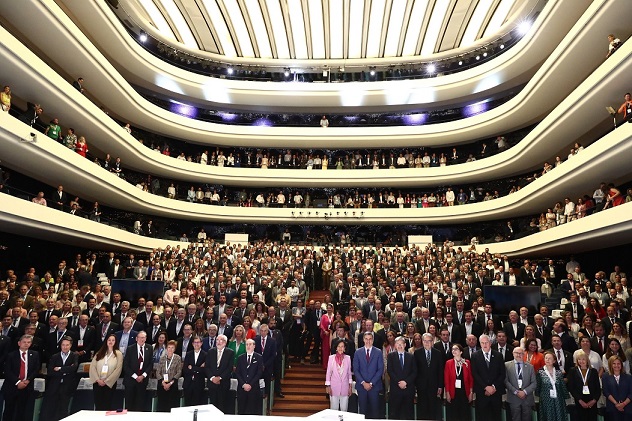Valencia, 10 May 2023. More than 700 rectors from 14 countries, including Spain, have endorsed the ‘Valencia Declaration on University and Society’ in the framework of the 5th International Rectors’ Summit in which they commit to strengthen the mission of the University so that teaching, research and knowledge transfer integrate social, environmental and economic challenges, thus redoubling the commitment and actions towards the welfare and progress of our communities, the planet and society in general.

Universities have always played a determinant role in societal advancement. Their classrooms and laboratories have always nurtured the crucial questions that need an answer. Through teaching, research and the transfer of knowledge, universities have ceaselessly offered solutions to all kinds of challenges. And they prepare us to get ahead of these problems.
Our world is interconnected and complex, and technology is advancing exponentially.
Enormous social and environmental challenges lie ahead, and creative, innovative and transformative solutions are urgently required.
Universities have always acted as beacons lighting the path to societal progress. They produce the citizens that have to lead the way to change. Professionals that seek to continually consolidate their knowledge and skills over their lifetimes in order to successfully navigate through environments that are impossible to predict. That requires them to complement their technological skills with other higher-order disciplines, such as emotional intelligence, flexibility and global thinking. Alongside all of that knowledge, a
humanistic perspective promoting values like solidarity and ethics is becoming increasingly necessary in a world aspiring to be fair, equitable and sustainable.
Moreover, universities’ research-focused mission places them in a unique position to help
us move towards knowledge- and innovation-based societies. The knowledge and technology that universities produce need to be transferred in such a way that they are
accepted and widely used.
Universities have a great ability to not only contribute to, but also to be at the vanguard of, rigorous sustainable development centred around critical thinking and social engagement.
Rectors and their governance teams play a key role in successfully overseeing the adaptation needed within their institutions. They are the driving force behind the change
to a sustainable future, which they have made part of their mission.
The rectors of the universities represented at the 5th Universia International Rectors’ Summit due to be held in Valencia (Spain) on 8, 9 and 10 May 2023, with the theme of ‘University and Society’ and centred around the topics of (i) lifelong learning, (ii) entrepreneurship and innovation and (iii) networks and interconnection undertake to:
- Further develop our universities’ missions so that their teaching, research and knowledge transfer take social, environmental and economic challenges into consideration, thereby stepping up their commitment to, and actions aimed at improving, the wellbeing and advancement of our communities, the planet and society as a whole.
- Extend learning opportunities to the different stages of adult life by broadening and adding flexibility to our universities’ educational formats so that they reflect the different learning needs of various and varied audiences.
- Provide our students with a comprehensive education that encompasses multidisciplinary knowledge, transversal skills and values that prepare them to enter and shape the future labour market, as well as to acquit themselves successfully and take the lead in the societies of the future.
- Bestow our students with skills that enable innovation and entrepreneurship, thereby enhancing their employability and empowering them to conceive, develop and manage enterprising and sustainable initiatives that provide solutions to present and future challenges.
- Incorporate global and local challenges into our universities’ research agendas; increase the interdisciplinary nature of our research; and promote the transfer and broad dissemination of the outcomes of such research to the benefit of society.
- Facilitate different forms of mobility for our universities’ students and academic staff including geographical, virtual and intersectoral mobility – with the aim of promoting cultural exchange and enrichment, as well as open and inclusive education.
- Increase collaboration with other universities, governments, industry and society in general with respect to teaching, research and knowledge transfer, thereby creating synergies, building up resources, scaling up initiatives, reinforcing alliances by means of communal higher education spaces, and learning together to create greater value for society.

